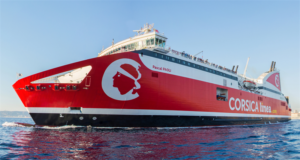Wärtsilä made Corsica Linea achieving fuel savings

Corsica Linea has achieved significant fuel savings following the installation of a Wärtsilä retrofit package on its ferry Pascal Paoli.
The upgrade has led to fuel savings of up to 22% trip, thanks to the integration of a twin screw controllable pitch propeller system with blades optimized for the vessel’s operating profile, Wärtsilä’s EnergoProFin energy-saving propeller cap, a modernized controls system, and customized combinator curves for different operating modes.
The retrofitting work was completed at the end of 2024 and validated through computational fluid dynamics simulations, with results later confirmed during sea trials involving the vessel’s chief engineer.
In monetary terms, the savings amount to approximately US$7,700 per trip. Alongside the financial benefits, the retrofit has significantly reduced emissions, contributing to Corsica Linea’s broader decarbonisation efforts and ensuring compliance with more stringent carbon regulations.
According to Xavier Esnault, Energy Transition Project Manager at Corsica Linea, the efficiency gains support both operational cost reductions and the company’s target of cutting CO₂ emissions by 40 percent by 2030.
The Pascal Paoli, a 174-metre-long RoPax ferry operating between Marseille and Bastia, is part of a ferry sector that is under growing pressure to reach net-zero carbon operations while maintaining reliability and cost efficiency.
Wärtsilä’s Product Manager for Propulsion, Andrey Dudko, noted that ferry operators like Corsica Linea are increasingly adopting technologies that minimize service disruption and maximize returns while supporting environmental goals.
The Pascal Paoli operates with two Wärtsilä 46 engines per shaftline and has multiple operational configurations, including sailing and maneuvering with one or two engines per shaftline. Importantly, the retrofit did not affect the vessel’s maneuverability.
This project comes at a time when ferry operators face mounting regulatory and market-driven demands to reduce emissions.
By introducing a cost to greenhouse gas emissions, the IMO is encouraging the adoption of technologies like those used in this retrofit, as part of a broader push toward operational improvements, onboard emission-reduction systems, and the transition to sustainable fuels.
The post Wärtsilä made Corsica Linea achieving fuel savings appeared first on Container News.
Content Original Link:
" target="_blank">


































































